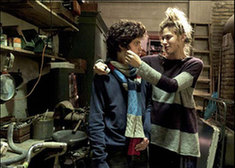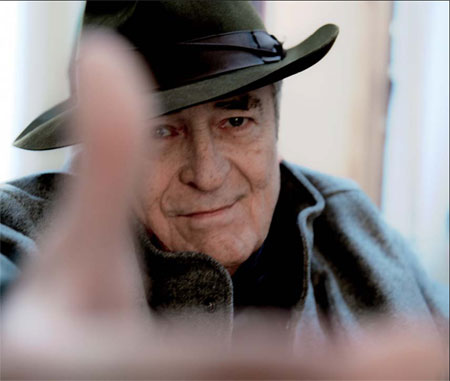Heart like a reel
Updated: 2012-11-30 09:59
By Mariella Radaelli (China Daily)
|
|||||||||||
|
Above: Bernardo Bertolucci, 61, directed The Last Emperor. Right: Lorenzo and his half-sister Olivia in the basement of their family home in You and Me, a new film of Bertolucci's. |

Bernardo Bertolucci on his new movie and an illustrious career that saw him court controversy and gain access to the forbidden city
Bernardo Bertolucci, the first foreign director to film inside the Forbidden City, tackles the loneliness of youth and its obscure necessity in his new film Me and You, which was released in Italy in October. I met him in Milan, at the Giorgio Armani Hotel. When I entered his hotel suite, he was sitting by the windowsill in his wheelchair, looking out at the sky. He looked relaxed and happy to be back after a nine-year hiatus from filmmaking. "I need to go on now. It's like a therapy," he says.
Radicalism and rebellion have always been a major part of Bertolucci's arthouse cinema style. Even today the legendary Italian film director (who was born in 1941 on a farm near Parma) maintains his alluring, radical style, and psychoanalysis continues to be a significant feature of his cinematography.
"It's like having an additional lens on my camera," says the director, who last year received an honorary Palme d'Or at the Cannes Film Festival, while the European Film Academy's Lifetime Achievement Award will be conferred on him on Dec 1 in Malta.
Next year will mark the 25th anniversary of The Last Emperor, Bertolucci's stunning epic set in China, which won nine Oscars. It was the first time that a foreign film director had been given permission to shoot in the Forbidden City.
"There was a commission that gave the permission, the China Film Production Co. We were friends, and also they were captivated by this unique project and by my passion for it. I had read the autobiography of China's last emperor Pu Yi, the way he talked about his own life fascinated me," says Bertolucci.
China was a source of "infinite emotion, and a superlative enriching experience", he adds.
"At the beginning I said to myself, 'Oh hell, I don't know the Chinese. How does a Chinese person turn on a television?' I had to throw myself into it, follow my intuition. I thought that the Chinese were some of the most intelligent people I had ever met in my life, throughout my travels."
Was it a fascination with exoticism?
"Yes, exactly that, very much. I am really enchanted by differences. However slowly, as you get to know someone from a different culture, you realize that they are not that different. They are just like you. We all share the same dreams," he says.
"I was not able to quarrel in China. I never had an argument. Inside the Forbidden City, I could see mysterious courtyards and massive closed doors that you could tell had been closed for who knows how long. I made friends with one of the guards. I told him, 'Come on, take me there tomorrow, let me see that.'
"The man brought enormous keys: tlot, tlot, tlot went the sound of these keys going into the rusty locks that opened the doors of abandoned pavilions. You can't imagine how fascinating they were. What a strong emotion. My experience in China is always connected with this image of my looking for keys to open doors."
Bertolucci decided to make The Last Emperor in 1984.
"My first trip to China was that year, when I made agreements with the Chinese authorities. Then we returned for a look around in 1985, so we came back three months before filming in 1986. In those three years I saw China open itself up. You could see a great people, very busy and occupied. I saw smiles spread across their faces."
His 1972 hit Last Tango in Paris earned great success but was also regarded as scandalous. Some say Bertolucci was escaping from this when he took on The Last Emperor.
"Maybe I needed to handle success more gracefully. I had no idea that Last Tango would be considered so outrageous. Time had passed of course, but it was not bad to let things settle down a bit more, looking to the east, drawing on Eastern wisdom. It could be of help," he says.
It was following Last Tango in Paris that Bertolucci embarked on his trilogy of "faraway films."
The first was The Last Emperor, followed by The Sheltering Sky (starring Debra Winger) with its north African desert vistas, and then Little Buddha, filmed in India and Bhutan.
"I was so fed up with Italy in the 1980s that I needed to explore a different reality," he says.
China Daily was the only daily newspaper he read during the shooting of The Last Emperor.
"I would get it everyday. I had gotten into the habit of reading it every morning at 6:40 in the breakfast room, where light conditions were low," he says.
"I recall that I had to hold the newspaper at arm's length to be able to read the letters. Close objects would appear fuzzy or blurry, while distant ones would remain in focus. It was there, reading China Daily, that I realized that I was aging."
Bertolucci's new film, You and Me, is an intimate tale based on a novel by Italian writer Niccolo Ammaniti.
The protagonist is a restless and discontent adolescent, Lorenzo, played by Iacopo Olmo Antinori, making his acting debut.
Lorenzo's loneliness belies a painful state of mind that leaves him socially incapacitated; he can't relate to his mother, schoolmates or the world in general.
Lorenzo does not feel like taking part in a skiing holiday with his school, so he tells his mother he is going, but instead hides in the basement of the family home.
His hiding place is discovered by his half-sister Olivia, a failed video artist devastated by drug addiction. Olivia's role is played by Tea Falco.
The basement gradually stops being a space of immurement and turns into a room of freedom, where Lorenzo experiences a deep psychological transformation.
"I liked the story of Lorenzo; I liked this innocent lie told inside his home. It is reassuring because he hides in the basement of his own home, which becomes a sort of protective and safe area," says Bertolucci.
I asked Bertolucci why he chose to portray youth again, as he did in Stealing Beauty (1996) and in the erotic drama The Dreamers (2003).
"I think that my growth process stopped at age 15. I believe I am a case of what Americans call arrested development. I discovered this now, when working with this very skilled young actor. I felt so at ease with him. When I first saw his eyes, they reminded me of Pier Paolo Pasolini (the great filmmaker, writer and poet who was also Bertolucci's mentor)," he says.
Every scene was shot just a minute from Bertolucci's home in Rome, in the painter Sandro Chia's studio, which was set up to look like a basement.
"I was able to arrange it in a way that unity of place, and that umbilical cord that stretched from my house to the set, were not affected," says Bertolucci, who ironically calls his wheelchair "the electric chair", which in the movie world refers to a camera dolly.
"It was a punishment from above, for having used too many tracking shots in my films," he adds.
As a boy, Bertolucci wanted to be a poet.
"Yes I did, just to emulate my father (Attilio Bertolucci was one of the greatest Italian poets of the 20th century)."
Bertolucci did in fact publish an award-winning book of poems in his teens. "But later, I stopped trying to be like Attilio, for I found my own language, cinema."
But his perennial restlessness of youth is still there, represented by Lorenzo in that basement.
"Yes, it was always like that and so it will be," he says.
For China Daily
Today's Top News
Rescuers race against time for quake victims
Telecom workers restore links
Coal mine blast kills 18 in Jilin
Intl scholarship puts China on the map
More bird flu patients discharged
Gold loses sheen, but still a safe bet
US 'turns blind eye to human rights'
Telecom workers restore links
Hot Topics
Lunar probe , China growth forecasts, Emission rules get tougher, China seen through 'colored lens', International board,
Editor's Picks

|

|

|

|

|

|






